|
Related FAQs: Tuskfish, Harlequin Tuskfish, Harlequin Tuskfish 2, Tuskfish Identification,
Tuskfish Selection,
Tuskfish Behavior,
Tuskfish
Compatibility, Tuskfish
Systems, Tuskfish
Feeding, Tuskfish
Disease, Tuskfish
Reproduction, Wrasses, Wrasse Selection, Wrasse Behavior, Wrasse Compatibility, Wrasse Feeding, Wrasse Diseases,
Related Articles: Harlequin Tuskfish, The Diversity of Wrasses, Family Labridae,
Cook Islands
Wrasses,
The Best Livestock for
Your Marine Aquarium
Wrasses called Tuskfish, the
Genus Choerodon
|
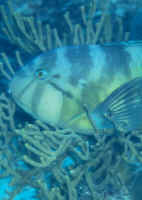
|
|
Bob Fenner
|
Choerodon graphicus
|
Species: Nineteen described according to ICLARM's
FishBase. Only one in regular use in the aquarium trade; Choerodon
fasciatus.
| Choerodon anchorago (Bloch 1791), the
Orange-Spotted Tuskfish. Indo-West Pacific; Sri Lanka to French
Polynesia. To about fifteen inches maximum length. A one foot
specimen in Bunaken/Manado/Celebes/Indonesia, another in Redang,
Malaysia. |
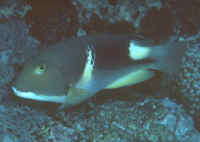
|
Bigger PIX:
The images in this table are linked
to large (desktop size) copies. Click on "framed" images
to go to the larger size. |
|
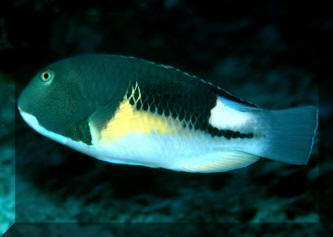
|
| Choerodon cephalotes (Castelnau 1875), the
Grass Tuskfish. Queensland to Indonesia. To fifteen inches in
length. Found associated with grass beds. This one off of the
Whitsundays in Australia. |
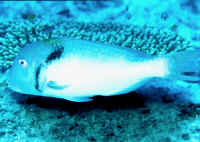
|
| Choerodon cyanodus (Richardson 1843), the
Blue Tuskfish. Queensland to western Australia. Reportedly feeds
mainly on mollusks. To twenty eight inches in length. Queensland,
Australia photo. |
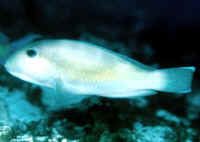
|
| Choerodon
fasciatus (Gunther 1867), the Harlequin Tuskfish. Western
Pacific, Australia to Taiwan. To twelve inches maximum length. The
only familiar member of the genus, and a gentle giant... as long as
you're more than mouth size, smart and fast enough. Crustaceans
need not apply as tankmates. |
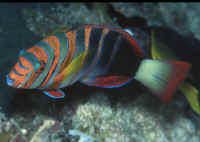
|
| Choerodon graphicus De Vis 1885, the Graphic
Tuskfish. West Pacific, Australia to New Caledonia. To twenty
inches in length. A shy species that is rarely seen in the
ornamental trade outside of the "Land Down Under". This
one off of Heron Island. |
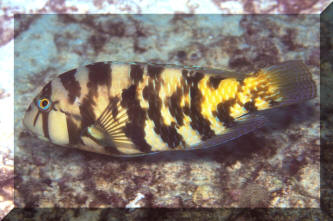
|
| Choerodon jordani (Snyder 1908),
Jordan's Tuskfish. West Pacific; Western Australia, Fiji,
Samoa. To 17 cm. Aquarium image. |
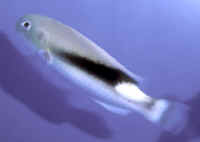
|
| Choerodon schoenleinii (Valenciennes 1839),
the Blackspot Tuskfish. Indo-West Pacific, Japan to Australia.
Largest member of the genus. Up to 38 inches long (1 meter) and 16
kilograms in weight. This one in Australia. |
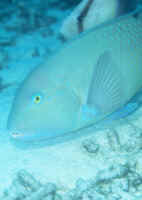
|
| Choerodon venustus (De Vis 1884), the Venus
Tuskfish. |
|
Choerodon zamboangae, the
Purple Eyebrow Tuskfish. Purple Eyebrow Tuskfish
4/3/17
> Hello Mr. Fenner,
<Gary>
> Your website has helped me in the past so I figured you would be the best
resource regarding my new acquisition. I picked up a Purple Eyebrow Tuskfish
from my LFS a couple of days ago.
> I had a Harlequin Tuskfish in my tank for a little over 12 years until he
finally expired a couple of months ago, so I do have some experience with
the Tuskfish family.
<Genus; Choerodon... Labrid/wrasse family>
> My question: I really can't find any info on this species. According to
Scott W. Michael's book on Wrasses & Parrotfishes, this is a rare fish in
the trade.
<Tis so. All other than Harlequins are rare>
The fish is gorgeous and he is eating Rod's brand of frozen food along with
Ocean Nutrition flake and Tetra Jumbo Krill.
> I am just curious if you could add any other info on this fish? From what
I am witnessing he acts very similar to a Harlequin Tuskfish, I.e. Eats
everything, burrows at night, swims all over the tank during the day, pretty
passive with the other inhabitants; a Blue Face Angel, Purple Tang, Emperor
Angel and a Diadem Dottyback.
<Yes; my input would be, is as yours above. Treat, care for as C. fasciata>
> Please see attached photo of the fish in my FOWLR tank. Feel free to
include this picture on your WetWeb Media website if you like.
<I thank you>
> If you would like, I keep a detailed log on my fish from purchase to
expiry or trade. I would be more than happy to keep your group up to date on
the behavior of this fish to better help and understand the husbandry of
this species.
> Thanks, Gary Lewandowski
<Thank you for sharing. I do encourage you to develop the log you mention;
perhaps document the husbandry of this fish; generate an article re. Bob
Fenner> |
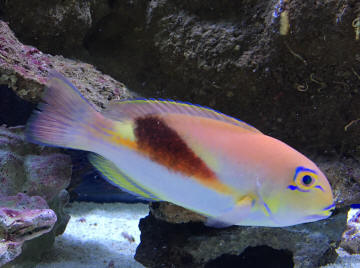
|
|
|

